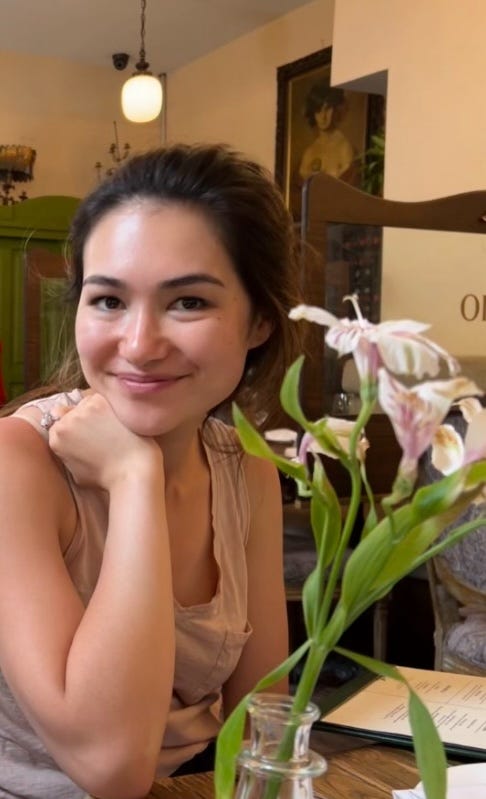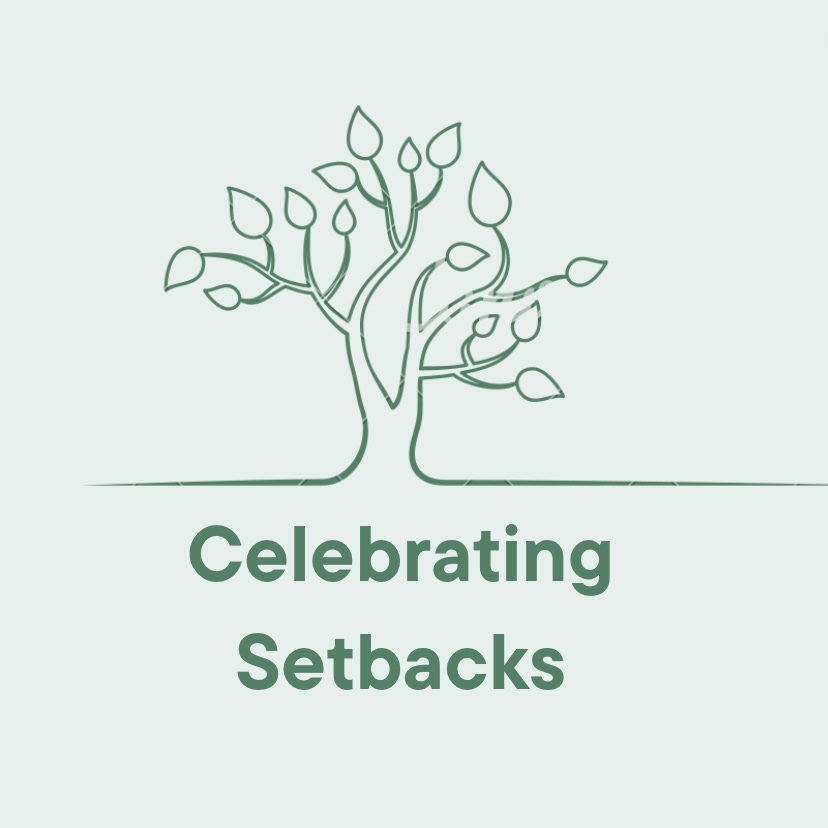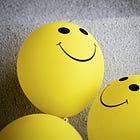Resilience Spotlight: Anna Raskind
On navigating job loss, learning from others, and the importance of sharing our struggles
Today, I’m thrilled to share my interview with
, author of .In her newsletter, Anna interviews inspiring people who have navigated various forms of adversity, including layoffs, health problems, and major career changes. These conversations have informed Anna’s perspective on how she deals with her own challenges, which she shares in her reflections after each interview.
Last year, Anna was laid off from her job in the tech industry. When she reached out to her network for advice, she realized that personal challenges — including job loss — were a far more common occurrence than she imagined.
She began Celebrating Setbacks to show readers that our struggles are far from unique and that we can lean on one another for support.
Anna currently lives in New York City. She is a graduate of Columbia University and recently started a new position at a startup tech company. (Congrats Anna!)
Below is our email Q&A.
1. Tell us about your career thus far.
I started in tech sales in 2018, in San Francisco. It was about a year after I had graduated from Columbia.
If you know anything about the time, it was a huge bull market in tech. It seemed like there was infinite potential and opportunity. I still love the industry, but I’m glad I started in it when I did. I gained a few years of adult life experience and got to experience some amazing career highs before any big lows.
I never thought I would get into sales or tech; I always thought I would end up being a journalist, or something writing-related. I kind of stumbled into tech with the help of some kind strangers and haven’t left it since.
I really enjoy what I do — building relationships with customers. But it’s also been nice to join Substack and get back into writing.
2. Can you talk about your experience being laid off and your immediate reactions? Did the layoff come as a shock or was it expected?
No, I wasn’t expecting it. I was working in sales at a very small software startup with about twenty people, and I knew the rest of the team pretty well. I really liked my team and had a very kind boss. I had heard about layoffs at large companies within the tech world, but it didn’t occur to me that they would also affect small companies, where everyone knew each other.
For some time, I had trouble processing the layoff. I have pretty much identified as an overachiever my whole life — always doing well in school, leading extracurricular activities, going to an Ivy League school, and aiming to be the best in any job I had.
I followed the playbook that the incredible Maddie Burton alludes to in her piece, “Some assembly required”, of the blueprint we’re taught for success: good grades + good college + good job = a good life. I think a lot of women learn this in particular, and often people from immigrant families.
I learned the hard way that this conventional model of success is not guaranteed, which has both good and bad implications. The good implication is that there are infinitely more creative paths to leading a “good” life. There’s not just one conventional way of success that follows a simple formula; a good life is a highly personal, unique experience.
That said, the problem with this conventional model is that you can feel like you’ve failed if things don’t go according to plan, which — surprise, surprise! — they often don’t. Life happens, which is something adults told me when I was younger, but I never understood. Now I do.
Looking back, I can say that the layoff was a pivotal moment for me because it forced me to stop relying on external approvals and signals to build my self-confidence and self-esteem. It definitely was not an easy experience to go through, though. I took it way too personally at first.
But I’m glad I could at least learn to separate my identity from a particular job title now, instead of later in life. Right now, I don’t have major responsibilities or obligations, such as kids, people to take care of, etc.
The layoff also made me a lot more grateful for what I have in my life.
3. In the weeks and months after your layoff, how did you get through that difficult time? Did you take time to regroup, or did you jump back into job hunting?
For a long time, I was uncomfortable talking about being laid off, because I assumed people would think it reflected on me personally. I feared everyone would wonder about it and judge me all the time.
As I have stepped more fully into adulthood and near 30, I realize that people don’t think about us nearly as much (if at all) as we think they do.
That said, some people’s reactions were definitely unhelpful. When I told them about my work situation, they acted as if someone had died. I think this is because many people are so ingrained in the “good job, good life” mindset I mentioned before.
Looking back, I think each person was projecting their own fear of losing their identity if they lost their job. For many people, jobs confer status and impact their sense of self-worth. Without it, they’d be completely lost.
Initially, I started looking at jobs right away, just because I couldn’t imagine not working. Ever since I decided I wanted to go to a competitive college when I was 13, I had been working nonstop. I rarely ever took breaks.
But I’m glad that in the end, I took a few months to regroup. What really helped me was being around people who had broken out of the matrix, so to speak: they had jobs they found fulfilling but they didn’t solely identify with it as their only source of self-esteem. I deliberately tried to surround myself with these kinds of people.
Community really got me out of my funk. Connecting with others that I deeply trusted was the turning point in my journey.
4. As you mentioned earlier, sometimes when someone loses a job, they feel disoriented, as if they've lost a piece of their identity. Did that happen to you, and if so, how did you handle it?
Yes, 100%. I think this hits “high achievers” particularly hard. It was the first major career setback I had ever dealt with.
Looking back, it sounds kind of par for the course — there’s always going to be ups and downs in our careers. But at the time, yes, it was destabilizing because it made me realize how fragile the foundation of my self-confidence was. It was built on titles and external things that could be taken away at any second.
While I did grow from the experience, that’s not to say I would wish job loss on anyone, because I certainly don’t. It’s hard to deal with and, of course, jobs are tied to money, which is a necessity in this world.
Sometimes it’s hard to separate practical fears from existential ones, but I tried to stay as specific as I could about any fears I had.
5. I love the premise of your newsletter, , how you seek out different perspectives from those who have been through challenging experiences.
Earlier, you mentioned the importance of connecting with others for support. Have you always done this, or did you start reaching out post-layoff?
I have always been obsessed with hearing people’s life stories and finding commonalities in how we deal with setbacks. As you once said to me, Chris: “We’re all in the same boat, we just don’t know it.” How amazing!
I’m especially interested in dissecting people’s “perfect” lives on the outside and showing that we are all flawed and human on the inside. It’s very easy to think that we are the only ones going through a struggle, but 99% of people just never broadcast theirs publicly.
I never thought about documenting any of the lessons I learned until I was talking to one of my good friends one day. I was telling her about my dilemma, how I felt like I had gone through several hard life experiences at once — including the layoff — that I didn’t feel like many people understood. She knew my penchant for writing and interviewing and suggested the concept of sharing other people’s stories.
It’s been an amazing reaction, especially among people who haven’t dealt with the particular challenges I discuss. People who haven’t gone through layoffs are resonating with the job loss interview with the incredible Joel Hoekstra, and people who have never dealt with cancer personally also appreciated the interview with my former colleague, Andrew.
I think sharing any bit of transparency around challenges — whatever they may be — is greatly appreciated in this world. And the more I hear people’s real stories and experiences, I realize that there is so much suffering I wasn’t even aware of. It helps me feel grateful for the things that I do have going for me.
6. What advice would you give to someone who has recently experienced a layoff or job challenge?
I asked this exact question to my first guest, Joel. It’s funny to be on the other side of the interview now!
I’m going to echo his advice, because it’s amazing. Whatever time you can take to process what happened — even if it’s just a few days, or a week, or whatever — do it. Otherwise, you risk taking action reactively, and getting yourself into a situation you might regret long-term. But I get the temptation to take action, pronto!
The other thing I’d say is to remember that you are not alone in career struggles. The more I talk to people, the more I realize every single person deals with career issues, even those in high stations, like celebrities, or CEOs of humongous companies. There is no getting around it.
Even if they haven’t faced “adversity” yet, it’s impossible to avoid it in life. It’s part of the human experience. It’s not some unique issue that only you face.
7. Is there anything else you'd like to share?
I would just say that one moment can change everything. (If you want a good example of this, check out the NASA story about Nir Zicherman in Chris’s article.)
You never know how one great random moment can change the course of your life. If you are feeling discouraged, I’d say to just keep that in mind.
To use a metaphor — I have recently gotten into stocks because my partner is really good at picking them. In stocks, one good pick — finding an Apple, for example — can make up for other losses you experience.
All my success in life (in love, friendships, looking for jobs, etc.) has truly come from a few great moments. These people and experiences are so incredible that I don’t even think about the “losses” anymore.
In fact, I’m grateful for the “losses” because they gave me more experience to get closer to the “winners” in my life.
So keep hunting for these life-changing moments!




















"For a long time, I was uncomfortable talking about being laid off, because I assumed people would think it reflected on me personally." Such an honest reflection. I had the same experience, even though it didn't track with what other people *actually* felt.
This was a wonderful interview...thanks to Anna for sharing her smart, vulnerable insights!
Such a great interview, Chris. I had a lot of the same feelings/experiences as Anna when I got laid off in 2011. It was nice to hear those echoed in someone else's experience. I don't think I've learned quite as much about myself in a short period of time as I did in those 3 months I was job-less (I also got to go to the beach when it wasn't crowded which was a bonus).